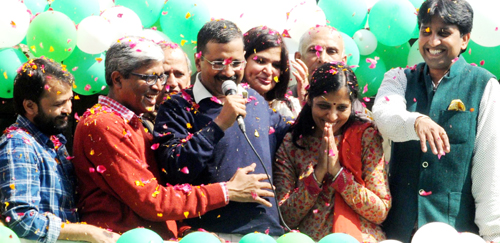
NEW DELHI, Feb 10: Scripting a new political narrative, Arvind Kejriwal’s royal come back leading the AAP to a spectacular victory, reflects his strong positioning as a “change agent” that scuppered BJP’s bid to power in the national capital and put a break on the Modi juggernaut.
The magnificent victory is being considered awe-inspiring as the 46-year-old bespectacled IITian, notwithstanding a string of electoral triumphs for BJP since the May Lok Sabha polls, managed to anchor a campaign that wooed all sections in the city.
Quietly spreading his party’s wings after the Lok Sabha poll debacle, the activist-turned-politician achieved the extraordinary feat by taking his “participative politics” model to the masses through a strong army of dedicated volunteers and his sheer perseverance.
Kejriwal, who had faced huge criticism for resigning as the Chief Minister after remaining in power for 49-days, expanded the party’s base by anchoring an unconventional approach to take AAP beyond his support base of the poor and lower middle class families.
Promising change, the former Delhi Chief Minister in taking AAP’s agenda to the people appeared much mellower as he apologised to the people for quitting Government on February 14 last year while successfully connecting with all sections.
Emerging as a mascot of an alternative brand of politics, the engineer-turned-civil servant had changed the political discourse when in the last Delhi polls he decimated Congress after 15-year rule by winning 28 seats and also handed out a crushing defeat to then Chief Minister Sheila Dikshit in her New Delhi seat.
He had courted controversy within weeks of becoming Chief Minister by sitting on a dharna in the heart of Delhi near Parliament House over his demand for suspending three police officers for allegedly not acting against criminals.
He had also come under attack on the governance agenda.
Born on August 16, 1968 in Hisar in Haryana to Gobind Ram Kejriwal and Gita Devi, Kejriwal sent the entire political spectrum into a tizzy, attacking both BJP and Congress on the issues of corruption, exorbitant rise in power and water tariff, safety of women and clearly managed to make a huge dent in the traditional vote banks of both the parties.
Belying all claims of being a “non-actor or no factor” in the Delhi Assembly elections by Congress and BJP, Kejriwal, a man of simple tastes, came into prominence from the agitation by 75-year-old activist Anna Hazare in support of Jan Lokpal Bill in 2011. Soft-spoken but a man with strong conviction, the Ramon Magsaysay award winner was part of the Team Anna, along with first woman IPS officer Kiran Bedi, lawyer Prashant Bhushan and others.
He was the civil society representative member of the committee constituted by the Government to draft the Jan Lokpal bill, following the campaign for introduction of the anti-graft legislation.
After feeling “betrayed” by the government when it rejected their draft, Congress and other leaders challenged them to join politics, win elections and come to Parliament if they wanted to “fight system from within”, root out corruption and get the Jan Lokpal Bill passed.
Known for taking up challenges, the indefatigable activist decided to take a plunge into politics and formed the “Aam Aadmi Party” on November 26, 2012, after a formal split of Team Anna.
The party name — Aam Aadmi Party — reflects the phrase Aam Aadmi or “common man”, whose interests Kejriwal pledged to represent and got its poll symbol “broom” in July this year.
A bright academic, Kejriwal passed out as a Mechanical Engineering graduate from IIT Kharagpur.
He joined Tata Steel in 1989 and after working for three years, he resigned in 1992 to take up the Union Public Service Commission examination which he cleared to become an Indian Revenue Service(IRS) officer.
Being in government service, Kejriwal was active in taking up social cause and worked for implementation of Right to Information Act(RTI) at grass root level.
His efforts in the enactment of the RTI Act to empower the poorest citizens of India won him the Ramon Magsaysay Award for Emergent Leadership in 2006. In February 2006, after resigning as Joint Commissioner in the Income Tax Department he became a full-time activist and started an NGO, Public Cause Research Foundation, with his award money as a corpus fund. (PTI)

